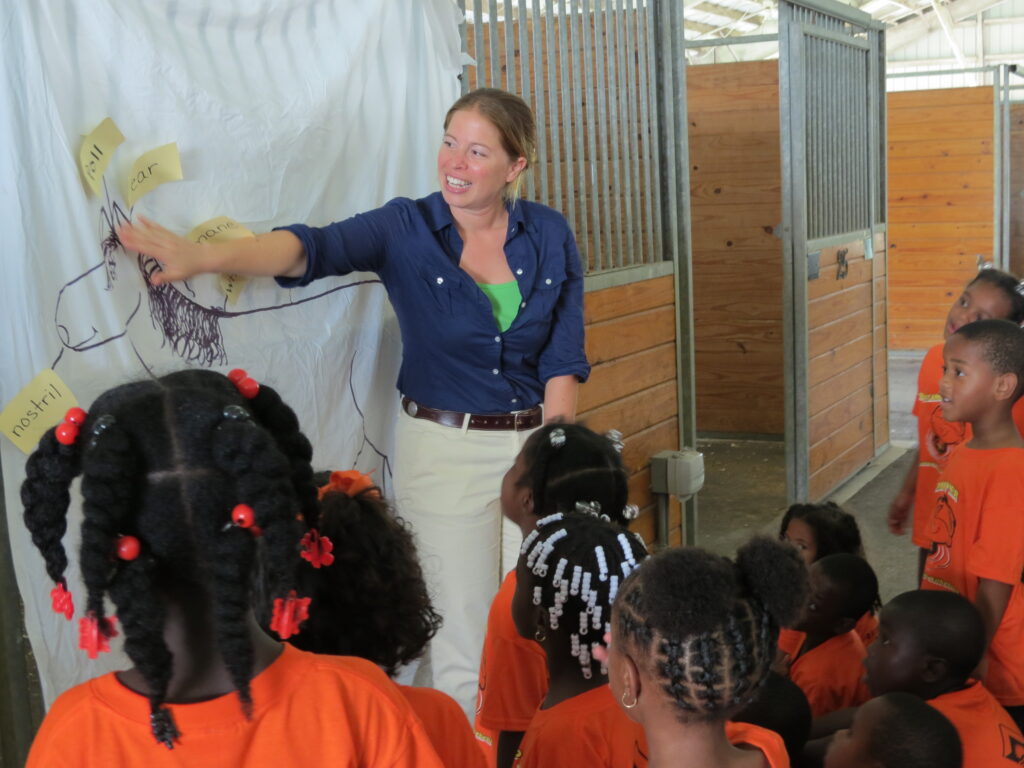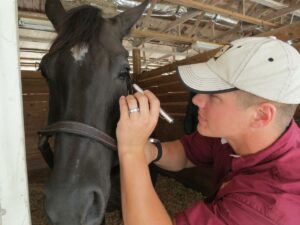Tag: lukens
Shipping fever is a respiratory disease complex associated with the transport of horses. A common scenario for shipping fever is when a horse is transported from its barn to another state to attend a show. The horse may be healthy and well-hydrated before entering the trailer, but the stress of travel can weaken the immune system.
Another leading factor is tying a horse’s head up while trailering long distances. The mucociliary apparatus of the trachea, which clears dirt and debris from the lower airway, is interrupted due to dehydration, change in temperature, and the inability of the horse to lower its head. The introduction of foreign material into the lower airway can lead to pneumonia, fluid in the pleural cavity (surrounding the lungs), and associated respiratory distress.
Signs and Symptoms to Watch For
Common symptoms noted are hyperventilation, increased rectal temperature, coughing, and nasal discharge after travel. The horse may seem depressed, not willing to work, and not interested in food or water. It is important to call the vet immediately if any of these symptoms are observed after a horse travels. The faster an infection in the lower airway is treated, the quicker and more likely the horse can recover. Shipping fever, if left untreated, can lead to severe pleuropneumonia, which can be life-threatening.
Treatment of Shipping Fever
Initial treatment includes antibiotics, anti-inflammatories, and hydration. If pneumonia progresses without treatment, surgery may be indicated, which can include removal of a rib and placement of chest drains (to drain fluid around the lungs). The vet should be called, and it is crucial to begin treatment at the earliest sign.
There are several preemptive steps that can be implemented to reduce the risk of a horse developing respiratory disease related to travel:
- Split up long trailer rides over several days. Be sure to take breaks and let horses out of the trailer at least every 6-8 hours, if possible.
- Ensure the horse is properly hydrated before travel. Common preventative practice includes administration of oral or IV fluids by a veterinarian prior to travel.
- Discontinue any immunosuppressant drugs 48 hours prior to travel. This includes steroids such as dexamethasone.
- Ship horses in a box stall or similar enclosure so their heads do not have to be tied during travel.
- Ask a veterinarian about immunostimulant drugs that can be given prior to travel.

Introducing Dr. Ryan Lukens
Dr. Ryan Lukens joined the Palm Beach Equine Clinic team in June of 2012. He has been a great asset and some of you may not have had the opportunity to meet him.
Palm Beach Equine Clinic currently has 24 veterinarians providing exceptional veterinary care and client services. As we grow, thanks to our clients, we feel it is important that everyone gets to know our veterinarians. Not only professionally, but also personally. Each of our doctors brings exceptional veterinary skills and great personal strengths to our Palm Beach Equine Clinic Family. It is the combination of these strengths that makes our Team a success.
We sat down to interview Dr. Lukens and asked him to tell his story.
Q: You went to Ohio State and played football, do you feel that your football career helped you with your future in veterinary medicine?
A: Yes, I played football for 5 years at Ohio State, from 2004 to 2008. I was a fullback and a linebacker. My senior season was my freshman year in veterinary school. I remember studying for Cell Biology and Clinical Pathology during my plane rides back from games.
My coaches were very accommodating. I would usually have to skip Sunday film day to study for Monday exams and then make up film review after my exams on Monday, which would usually have been a “day off” from football. Needless to say I was busy during that first quarter of vet school. Football taught me discipline and time management.
My Coach, Jim Tressel, instilled values in his players by group discussion and study of leadership books. These values affect my career today, I am always aware of how my actions and words affect everyone around me. The lessons from Coach Tressel have helped me improve my communication skills with my clients and fellow colleagues.
Q: Your wife is a small animal veterinarian, how did this play a part in your education and career?
A: My grades were above average during my last football season but improved the following quarter. This improvement in grades can be traced back to meeting my future wife in school a month after my football career ended. The day we met we spent most of our time studying together and immersing ourselves in our class work.
Studying became fun and we tackled the challenges together. She was small animal oriented and I was able to teach her equine aspects while she helped me with small animal based courses. From our separate experiences working with different animals our entire pre-vet school lives, we greatly improved each other’s understanding of former less-familiar species.
When we entered clinical rotations our 3rd year, I would always find a way to get out to the barn rather than stay in the small animal clinic. It was fun being able to teach my wife about horses, she had almost no experience with horses when we met.
Q: How do you feel about being a part of the Palm Beach Equine Clinic team of doctors? What kind of experiences have you had since joining PBEC?
A: I am more than happy to be a part of this prestigious clinic and to live in the center of horse country in South Florida. I do not miss lameness exams in the snow! I started working at Palm Beach Equine Clinic for over 6 weeks while I was finishing school. This opportunity led to a great start in my career. I was able to familiarize myself with the operation of this efficient, tertiary medical facility.
My interests in school and to this day are sports medicine and I always envisioned performing competent lameness exams. Over the past year and a half, my lameness exam numbers have increased exponentially. This past winter season I was successful in keeping several horses that had lameness issues early on sound throughout the entire season. I enjoy doing pre-purchase examinations. I am fortunate that this area offers a great amount of sale horses. Pre-purchase exams are also an excellent way to develop relationships with new riders and trainers.
Moving from Ohio, I was quickly introduced to “summer sores”. Habronemiasis (summer sores) are not seen clinically in the north. So becoming more educated on them and providing successful treatment has been an educational experience for me.
A fortunate part about being a team member is the number of doctors and specialized fields that Palm Beach Equine Clinic offers. This is what makes the veterinary care here so proficient. It benefits the patient and client as we are able to share ideas and consolidate treatment options amongst our large team.
Q: What are your goals for the future?
A: I am currently working on becoming ISELP (International Society of Equine Locomotor Pathology) certified. This course and certification will continue to expand my knowledge and treatments of lameness. I look forward to meeting new clients and treating new horses. In the future, I want to join the ranks of the lameness experts known throughout the country. Wellington is one the greatest places in the world for the opportunity to treat the best horses in the world. I wouldn’t want to be anywhere else.
On May 10, 2013, Dr. Janet Greenfield-Davis participated in career day at Elbridge Elementary School. Elbridge Elementary is one of many schools that Dr. Greenfield-Davis has donated her time and knowledge to educate our young students of today on equine veterinary medicine. Dr. Greenfield-Davis is the official veterinarian for Vinceremos Therapeutic Riding Center, which focuses on equine-related programs for special needs children. Dr. Greenfield-Davis enjoys educating the community while raising awareness of equine health.

“Educating our community and public service is a culture that we emphasize at Palm Beach Equine Clinic”, stated Dr. Scott Swerdlin, President of Palm Beach Equine Clinic.
Dr. Ryan Lukens recently completed an internship at Palm Beach Equine Clinic. Dr. Lukens excelled during his internship and was presented a contract toward a long and successful future with Palm Beach Equine Clinic. In the spirit of our mission statement, Dr. Lukens presented a lecture to 200 first graders concerning the anatomy of the horse with the Horse Tales Literacy Program. This event occurred at Good Earth Farm in Loxahatchee on Friday, May 17th.

“Dr Lukens was wonderful. He was knowledgeable and very patient with the first graders”, said Shelley LaConte, South Florida Director of the Horse Tales Literacy Project. “He had a smile on his face the whole day. It was a pleasure working with him. We were very grateful for his time and glad he is a part of Palm Beach Equine Clinic.” If you or any of your organizations would like a lecture or presenter please call Eques Solutions at 561-227- 1537.
